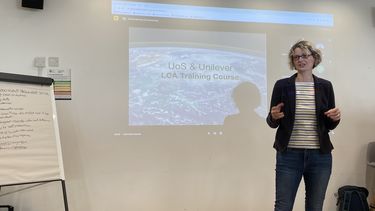There is an urgent need to accelerate action on a range of environmental issues. Understanding how products and services impact the environment is essential to identify improvement opportunities.
Life Cycle Assessment (LCA) is the main technique used to assess environmental impacts of products: there is a need to expand UK capability in this area to ensure national and company efforts to progress environmental commitments are robust and evidence-based.
For this reason, the University of Sheffield and Unilever have launched a strategic partnership to develop the next generation of LCA scientists. The partnership encompasses teaching, studentships and research, further strengthening the University’s training provision in LCA.
Dr Katy Armstrong, an Environmental Sustainability Scientist from Unilever’s Safety and Environmental Assurance Centre (SEAC), has been awarded a three-year visiting lectureship in the Department of Chemical and Biological Engineering (CBE) and will co-lead the partnership with Professor Rachael Rothman from CBE.
During the summer of 2023, a short course in LCA thinking, theory and practice was co-developed for final year MEng students, PhD students and PostDocs. This course was jointly delivered by Unilever and the University to more than 25 students and researchers during the autumn term.
Following the course, 11 MEng students have begun Masters research projects using LCA to address issues of high relevance to industry and society, such as the environmental impacts of reuse of plastics, the hydrogen economy, alternative packaging scenarios and energy storage. It’s expected that the students will be able to undertake a deeper level of analysis and demonstrate a wider range of LCA skills as a result of their earlier participation in the new course.
Professor Rachael Rothman said: “Sustainability is a high priority for the University and the department. We have been running Masters projects using LCA for several years and demand is always high.
"By incorporating a taught LCA element into the existing MEng course, we have enabled the students to quickly gain a deep understanding of LCA theory and application which can be applied within their projects.”
Unilever has a purpose to make sustainable living commonplace. To enable this, Unilever has been using LCA approaches for decades to assess the environmental impacts of products. Unilever’s environmental sustainability objectives, corporate reporting, product innovation and consumer communications are all informed and supported by the application of LCA and environmental footprinting.
Dr Katy Armstrong said: “Unilever is committed to developing and applying pioneering sustainability science. Training the next generation of sustainability scientists is key to ensuring sustainability goals and commitments are met, so our new collaboration with the University of Sheffield marks an exciting step forward.
"The partnership will enable students to gain a deeper understanding of LCA and its industrial applications, and will pave the way for new research areas.”
Unilever and CBE are also recruiting for a PhD studentship as part of the Centre for Doctoral Training in Resilient Decarbonised Fuel Energy Systems. The research will focus on accurately predicting the potential environmental impacts of low technology readiness level (TRL) chemical production routes once they are fully deployed.

